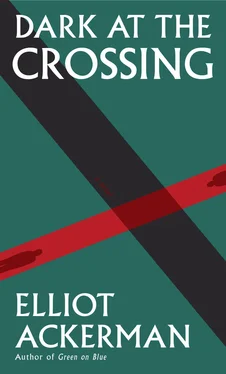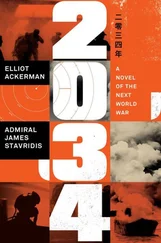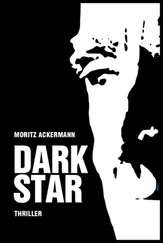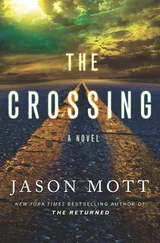“Are you going to buy something?” Jamil asked.
Haris glanced at the Peugeot. The boys had assembled in front of it, blocking the road, just as they’d done on his first trip in the taxi. Daphne sat in the passenger seat. One by one, she made eye contact with the boys, disarming their threatening posture with her gaze.
“No, we’re not going to buy anything,” announced Amir. Then, and in a softer voice, he spoke only to Jamil: “I have something to ask you.” Jamil flinched as Amir rested an arm around his shoulder. Amir turned toward the Peugeot, so did Haris. The three formed a huddle. “We are crossing the border,” said Amir. “Or, more accurately, Haris and my wife, Daphne, are.” Upon hearing her name, Daphne glanced up from the passenger seat. Her eyes met Jamil’s and flashed him a warm yet tired smile. He returned one, wincing against the pain in his swollen cheek.
“Who are you crossing with?” asked Jamil.
“The Daesh,” Haris replied.
Jamil tucked his chin to his chest, nodding respectfully. “That’s good,” he said. “They’re the best fighters.” And Haris noted that, unlike Marty, Amir, and even Saied, Jamil said nothing about their ideology. The Daesh could fight. This was all that mattered.
“We’re meeting our contact tomorrow morning at their regional headquarters in Kilis,” said Amir.
Again Jamil nodded. He stared at his feet, as if awaiting a further explanation, but Amir said nothing more. The three of them shared a silent moment. Then, looking confused, Jamil asked: “What do you need me for?”
Haris could feel Amir’s hesitation. He remembered how he’d felt when he first met Jamil, how he hadn’t wanted to ask anything of a boy who lived by the side of the road. Amir’s pride prevented him from requesting this final favor from Jamil, so it was left to Haris: “We don’t know where the regional headquarters is.”
Jamil tilted his head. “But they’ve agreed to take you across the border?”
Haris nodded.
“And you’ve agreed to fight alongside them?”
Again Haris nodded.
“Why don’t you know where to meet them?”
“Can you help?” asked Haris.
Jamil allowed his eyes to wander into the Peugeot. He glanced at Daphne, but as she listened to their negotiation, the kindness left her expression. To cross the border she needed Jamil. He continued to gaze at her, but his attempts to earn a sympathetic look in return were as futile as gazing into a portrait so it might return the same.
“What do I get?”
“We can pay you,” said Amir.
Jamil turned to look over his shoulder, toward the pack of boys who milled around the Peugeot, particularly the one who held the plastic bag of knickknacks. “I’ll help,” he said, “but I don’t want your money. I want you to take me across the border, to fight.”
“You’re too young,” Haris snapped back.
“I’m not too young,” said Jamil, his tone more even and controlled than Haris’s.
“How old are you?” asked Amir.
“Fourteen.”
“Fourteen,” said Haris.
“He’s not too young.” Daphne had rolled down her window. Her eyes fell on Jamil’s battered knuckles and swollen face. She glanced up at Haris and Amir. Before either of them could question her, she said it again forcefully: “He’s not too young.”
Jamil’s breath quickened, his chest rising and falling as if he were about to begin a race. He flung open the door behind Daphne’s seat, tumbling into the Peugeot. Wide-eyed, he stared back at Haris and Amir. Immediately, Haris felt the crowd collapsing on them. Starting with the boy who held the plastic bag, they rushed the car. Haris ran around to the other door, and Amir slid behind the steering wheel, turning the engine over. A few of the boys whacked at the doors with open palms. Haris couldn’t tell if they wanted to come or if they wanted to drag Jamil away for abandoning them. At first Amir drove slowly, not wishing to injure anyone. Then a rock hit the window by Daphne’s head, exploding a web of cracks across the glass. Amir accelerated as quickly as he could cycle through the gears. With hollow thuds, the Peugeot’s side mirrors swiped a few of the boys.
Both Jamil and Haris sat in the backseat, their faces pressed to the rear windshield. Left empty-handed, the pack of boys ran to the lean-to where Jamil had slept. They tore it down and threw its tarp and stakes beneath the traffic light. As the road narrowed into the distance, the pack blurred into a singularity, and Haris watched as in a last defiant act they took turns stamping on what had been Jamil’s home. Seeing how quickly these boys had turned on Jamil, someone who’d cared for them like an older brother, Haris felt empty. That emptiness twisted in his stomach — helping anyone so desperate seemed likely to end in a similar futility.
Haris looked toward Jamil, checking to see whether he was all right. Jamil sprung around, facing front. Flushed with excitement, he smoothed back his hair, which had tumbled over his forehead in their escape. A cheek-stretching grin brimmed up the swollen side of his face. He clapped his hands together once and laughed, crumpling over his legs. In a voice that could barely contain his thrill, Jamil said: “What a getaway! Just like out of a movie.”
Daphne turned around in her seat.
Her eyes glimmered with fear and regret, meeting Haris’s. If she didn’t feel it before, she surely felt it now: Jamil was too young.
In the old city, the streets ran thick with minarets. Buried here, in the catacomb of broken roads, was the Daesh’s regional headquarters. From the backseat, Jamil leaned over the gearshift. His head bobbed between Daphne and Amir as he spotted the way. From the bellied domes of the grand Canpolat, Akcurun and Ulu mosques, and from the corrugated steel roofs of back-door shanties, the faithful had built spires, clutching their way upward. Where the D850 fed into Kilis’s smaller roads, the smooth highway came apart like a river feeding a delta, the single strip of black asphalt ceding to riven pathways of dirt and concrete. Ancient pedestrian lanes ran in all directions, their cobblestones too narrow for a car. Flitting in and out of traffic, and up through these tributary lanes, cheap Chinese motorcycles — Lifans, Zongshens, Jialings — traveled past, always carrying more than a solitary rider.
In traffic so thick they drove touching bumpers, down alleys so tight they pulled in their side mirrors, through it all, Jamil shot off directions. They would have been lost without him. With each turn this became obvious. With each turn he proved himself essential.
Night fell before Jamil finally announced their arrival. The street was just like all the rest. Haris felt certain they’d already driven down it. Allowing the other cars to pass, Amir parked halfway up on the sidewalk. The traffic’s headlights cast a deathly glow inside the Peugeot. Haris gazed at their destination: a kebab house — Halil Usta — with a flashing hotel sign and arrow to the top floor. Turning on a vertical spit in the front window, a thick column of döner dripped grease. A man with a white apron and long knife sat on a stool by the browning meat. From time to time, he stood, shaving curled strips into a full pan. But the restaurant was empty. No one had ordered food. He seemed to do this from habit alone.
They gathered their bags and piled out of the car, all except Jamil, who stayed in the back. “Aren’t you coming inside?” asked Amir.
Jamil’s eyes darted toward their destination. “It’s not safe to leave the car out here all night,” he said. “One of us should really sleep in it.”
Amir looked at Daphne, deferring to her about the sense of this. “You’re not sleeping in the car,” she said.
Читать дальше












